Iranian Lawmaker Denies Tehran Reached Special Deal With IAEA's Grossi
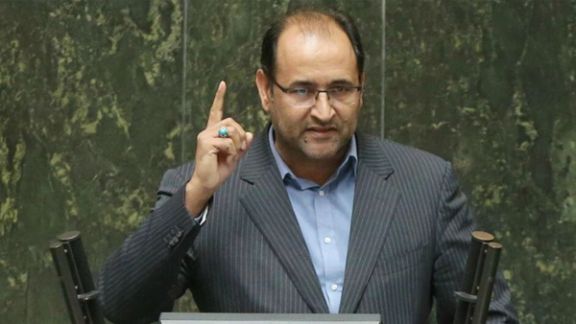
An Iranian member of parliament says Tehran did not make any special agreement with IAEA's Rafael Grossi during his recent visit, hailing it a diplomatic victory.

An Iranian member of parliament says Tehran did not make any special agreement with IAEA's Rafael Grossi during his recent visit, hailing it a diplomatic victory.
Jalil Rahimi-Jahanabadi told state news agency IRNA on Tuesday that in the joint statement following Grossi’s trip, it has been emphasized that Tehran continues the same voluntary cooperation in the form of inspections, accesses, and addressing the concerns of the agency.
The member of the Parliament's National Security and Foreign Policy Commission stated that Grossi's trip was more political than technical, adding that the agency's concerns were resolved during this trip and “the West came to the conclusion that Iran is not seeking to build an atomic bomb”.
“We hope that Grossi's report will lead to the revival of the Joint Comprehensive Plan of Action (JCPOA) and that Iran's nuclear dossier will be closed forever,” he said.
Jahanabadi reiterated the government's claims that since the signing of the JCPOA, Iran has voluntarily cooperated with the agency regarding the installation of cameras, adding that Tehran continues its voluntary cooperation with the agency and does not want its NPT membership be challenged.
The lawmaker rejected the West’s reports on uranium enrichments over 80% expressing that “they have been saying for several years that Iran is close to producing an atomic bomb, but Grossi's statements after his trip neutralized their plots”.
Iranian authorities have suggested the IAEA visit was a diplomatic success for the Islamic Republic, however, it has resulted in international disappointment.
"Iran must cooperate with the IAEA fully and without delay, and we look forward to additional reporting from the IAEA in the coming weeks on the steps taken by Iran," U.S. State Department spokesman Ned Price told reporters at a regular briefing on Monday.

The United States has demanded immediate clarification from Iran over more than 80-percent enriched uranium recently discovered by UN nuclear watchdog the IAEA.
US Ambassador to the International Atomic Energy Agency in Vienna, Laura Holgate, in a statement issued at the quarterly board meeting of the agency said, “Iran must clarify this issue immediately. Whether intentional or inadvertent, Iran’s actions continue to intensify tensions and push unprecedented boundaries.”
In February reports emerged, later confirmed by the IAEA that uranium particles enriched to 84 percent were detected at Iran’s underground Fordow enrichment site. The agency’s director general Rafael Grossi visited Iran last weekend and held talks with officials, including President Ebrahim Raisi. A joint statement issued at the end of Grossi’s trip highlighted general commitments made by Tehran to increase its cooperation with the UN watchdog, pending further planning meetings.
As Grossi’s trip immediately preceded the IAEA board meeting, it is not possible for the international community to know about Iran’s intentions of allowing more monitoring access to the agency. Diplomats say that for this reason, Iran might not be censured at the meeting for its violations until the picture becomes clear before the June meeting of the board.
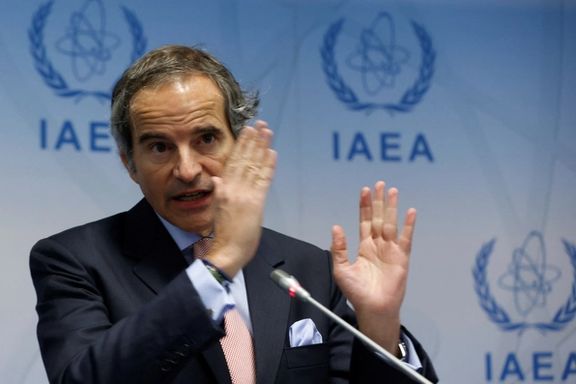
Ambassador Holgate underlined the importance of Grossi’s follow-up work with Tehran. “Should Iran follow through on its reported decision to take up certain transparency measures as conveyed to the Director General, it would be an encouraging sign, but we of course need to see if these steps are, in fact, implemented.”
Iran International’s correspondent in Vienna reported from the IAEA meeting that the agency seeks to interview personnel who were in charge of the enrichment machines when the 84-percent particles were produced. However, Iranian officials declared after Grossi left Tehran that no access will be given to the IAEA to speak with individuals.
State Department spokesperson Ned Price in his daily briefing on Tuesday reiterated Washington’s cautious welcome for Grossi’s agreements with Iran. Price said, “Now, the key point for us is that the joint statement between the IAEA and Iran was important. What will be much more important is the follow-through.”
The spokesperson also reiterated three demands the Biden administration has been underlining in recent weeks. “First, stop killing, stop suppressing your people; second, stop providing UAV technology to Russia; and third, release the wrongfully detained Americans that you have held.”
Talks with Tehran to revive the Obama-era nuclear accord known as JCPOA reached a deadlock last September and since then Washington has repeatedly said that it is not focused on the issue.
Despite its toughening position, critics of talks with Iran insist that the administration must come out and clearly say that the JCPOA is dead, but the White House insists it still thinks diplomacy is the best way to stop Iran’s nuclear program from reaching weaponization.
Many in Congress oppose negotiations with Iran that could result in suspending US sanctions and providing tens of billions of dollars in frozen funds to the Iranian regime.
Senator John Thune told Iran International’s correspondent Tuesday that “The Biden administration has in many cases turned a blind eye to some of the national security challenges we face. A nuclear Iran is certainly on top of that list.” He added that he is “not sure if Iran’s nuclear program is stoppable at this point.”
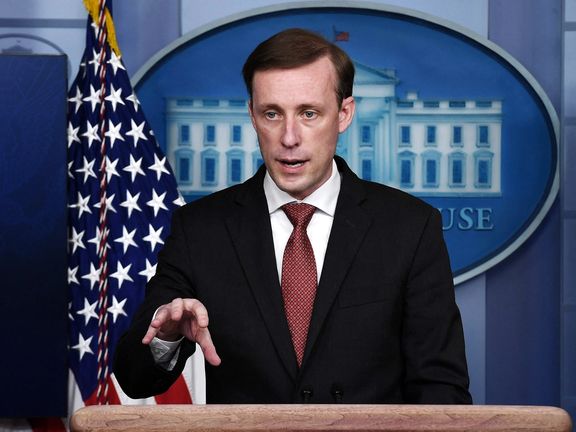
US and Israeli officials have pledged to enhance coordination on measures to prevent the Islamic Republic from acquiring a nuclear weapon and to further deter Iran’s hostile regional activities.
Assistant to US President for National Security Jake Sullivan met with Israeli National Security Advisor Tzachi Hanegbi, Israel's Minister of Strategic Affairs Ron Dermer, and a senior Israeli interagency delegation at the White House.
In a joint statement, the group said it had "reviewed with significant concern advances in Iran’s nuclear program and affirmed their mutual objective of further enhancing the longstanding security partnership between Israel and the United States".
They also reviewed recent joint military exercises between the US military and the Israel Defense Forces during the meeting. The United States conducted large-scale military drills with Israel in January, with some saying that the exercise was meant to be a message of deterrence to the Islamic Republic.
Negotiations to re-establish limitations on Iran’s nuclear program are in limbo and Tehran has gone beyond the previous limit on enrichment that existed under the 2015 nuclear deal known as the JCPOA.
Israeli leaders have been warning that they will resort to a military attack to prevent Iran from obtaining a nuclear bomb, although experts believe that would be a difficult task if Israel tries to do it alone, also risking full scale flare-up across the region.
It also complicates relationships with countries involved in the recent Abraham Accords, normalizing relations with Israel, such as the United Arab Emirates and Bahrain, which are trying not to inflame relations with Iran.
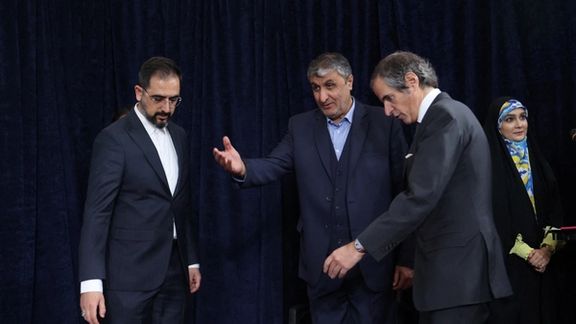
Western officials indicate there will be no censuring of Iran at a meeting of the UN watchdog, the IAEA this week in the wake of its visit to Tehran last weekend.
Rafael Grossi, IAEA's Director General, was invited by the Islamic Regime in a bid to show transparency, fighting the implications of bitter sanctions which are crippling the country's economy.
Grossi received commitments that the Islamic Republic will cooperate with the watchdog to resolve outstanding issues regarding monitoring and past activities but the pledges Iran made have yet to be worked out in any great detail. On Monday, Grossi announced in a press conference that he cannot guarantee any tangible changes or that greater transparency will result from his visit.
"We have our ideas and this will be part of the technical discussions that are going to be undertaken as a follow-up to my visit, and to the joint statement. And a technical team will be travelling to Iran very soon to do that," he said. "We will have to discuss...this, how do we do it," Grossi said on Monday, conceding that this and other issues would largely hinge on future technical talks.
His remarks were met with skepticism by the global community, seen as a walking back of the statements he had made only two days before (Saturday) in which Grossi told a news conference they had agreed to re-install extra monitoring equipment such as surveillance cameras, at nuclear sites that was put in place under Iran's 2015 nuclear deal with major powers, but then removed last year as the deal unravelled following the U.S. withdrawal in 2018.
AFP also quoted anonymous Western diplomats that there are no plans to censure the Islamic Republic at the board meeting.
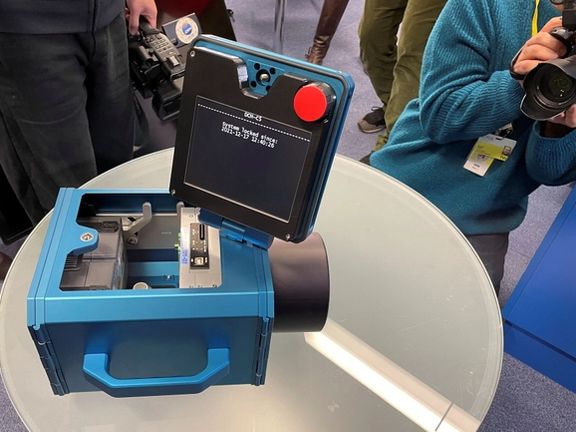
The US State Department spokesperson Ned Price said he held low hopes to Iran's keeping its promises, given recent history. During his Monday briefing with reporters, he said: “Iran committed to take important steps and expressed a readiness to provide long overdue cooperation with the agency on the outstanding safeguards issues. We expect, most importantly, Iran to take prompt and concrete action in line with the joint statement. Too many times in the past we’ve seen Iran issue vague promises, only never to follow through.”
Iran has been repeatedly censured in the past two years by the IAEA Board of Governors consisting of 35 nations for its lack of cooperation with the international nuclear watchdog.
Prior to this week's meeting, it was disclosed that monitoring discovered particles of uranium enriched to 84-percent purity in Iran’s Fordow enrichment installation, and it was expected that a more stringent censure would be issued at the board meeting. But Grossi’s 11th hour trip to Tehran and pledges made by the Iranian side seem to have eliminated that possibility, for now.
Both Grossi and Price have also indicated that it will take weeks, if not months, until Iran’s real intentions can be judged. This means that the current board meeting might just adopt a wait-and-see approach and not issue a resolution.
This was most likely Tehran’s intention when they invited Grossi for talks at short notice, as Iran has faced increasing isolation internationally since September saw anti-regime protests sweep across the country. Brutal crackdowns have led to more than 500 Iranian civilians being killed in protests, sparked by the death in custody of Mahsa Amini, arrested by the morality police for not wearing her hijab properly.
Additionally, revelations of Iran's supplying kamikaze drones to Russia since September has induced further Western sanctions and dashed the hopes for the resumption of nuclear talks.
“When it comes to the meeting of the Board of Governors, of course Iran will be a topic at the Board of Governors," Price said in this week's briefing. "We’re engaged with our European allies, we’re also engaged with the IAEA itself, on the most effective means by which to see to it that Iran is held to the commitments that it has made."
One reporter asked Price about repeated statements by Iranian officials that they have been receiving messages from Washington about resuming JCPOA talks that reached a deadlock last September which Price dismissed, reiterating that for the Biden administration the talks are not a priority.
“I haven’t seen the full context of these remarks, but what I can tell you is that we have heard plenty of misleading statements and outright lies from Iranian officials over the course of weeks now. The JCPOA is not on the agenda; it has not been on the agenda for some time.”
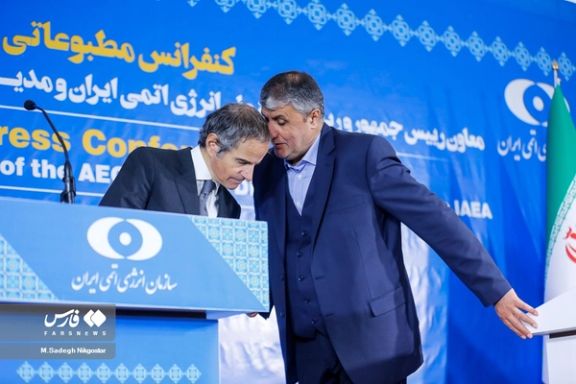
Regardless of the apparent hullabaloo about IAEA chief Rafael Grossi’s visit to Tehran, politicians and commentators in Iran appear to be skeptical about the outcome of the visit.
The political editor of a leading reformist daily Etemad in Tehran, Sara Massoumi, noted that hours after a joint press conference by Grossi and Iranian nuclear chief Mohammad Eslami, the official website of President Ebrahim Raisi and all of Iran's news agencies deleted parts of what they had earlier published as Grossi's statement in the news conference.
In the deleted parts Grossi was quoted as having said, "We have had very constructive and positive meetings with Iranian officials," and "It is quite clear who should be blamed for the current situation of the JCPOA." Another deleted sentence blamed "sinister elements" for preventing IAEA's cooperation with the Islamic Republic.
On Sunday, foreign policy analyst Amir Ali Abolfath said in an interview with conservative Nameh News website that Iran should not pin its hopes on the visit, adding that "regardless of the success or failure of Grossi's trip, there is no bright outlook for the Islamic Republic's relations with the IAEA."
Abolfath noted that the IAEA is a UN body and various countries do not have equal weights at the United Nations particularly in the areas linked to security issues. He added that one cannot expect the IAEA to be satisfied about Iran's nuclear activities as long as tensions between Tehran and Washington are not reduced.
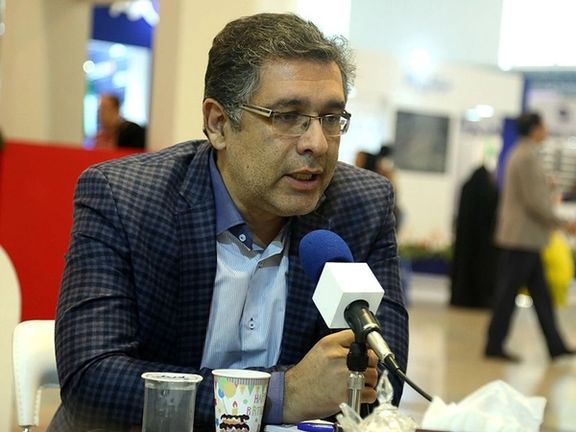
Meanwhile, former diplomat Fereydoun Majlesi pointed out in an interview with Khabar Online that "Iran's main problem is to have US sanctions lifted and not a visit to Tehran by Grossi." Majlesi also pointed out that Tehran should know that it cannot endlessly attack its adversaries without any repercussion.
He added that if the UN trigger mechanism or ‘snapback’ of international sanctions is activated, Iran will be in a difficult position and will have to reach out to foreign powers to solve its problems. Majlesi reiterated: "I have said many times in more than two years that the JCPOA is a burnt out case. Iran's problems are now about the Non Proliferation Treaty (NPT) and other nuclear commitments. Leaving the NPT is extremely dangerous for Iran and might lead to snapback before the end of 2023.
Grossi's visit, he said was mainly about making matters clear after 84-percent enriched uranium was detected in Iran and Grossi wanted to warn Tehran that this requires more rigorous monitoring and inspection of its nuclear activity.
Meanwhile, the editor of hardline daily Kayhan Hossein Shariatmadari wrote in a commentary on Sunday that Grossi's visit to Tehran was unnecessary and accused the IAEA chief of reporting back to Israel. He said Grossi will inform Israel before anyone else of the outcome of his visit.
In another development, the former chairman of parliament's National Security and Foreign Policy Committee Heshmatollah Falahatpisheh said in an interview with Etemad Online that Iran's Foreign Ministry is incapable of handling nuclear negotiations with JCPOA partners, and the matter should be handed over to the Supreme Council of National Security, a body closely linked to Supreme Leader Ali Khamenei.
Falahatpisheh said that the Foreign Ministry has so far missed all the opportunities it had to settle the nuclear disputes and reach an agreement with the United States and Europe.
He also said in another interview with Rouydad24 that the JCPOA should be removed from the gambling table of world powers and from the political rivalries between various political factions in Iran.
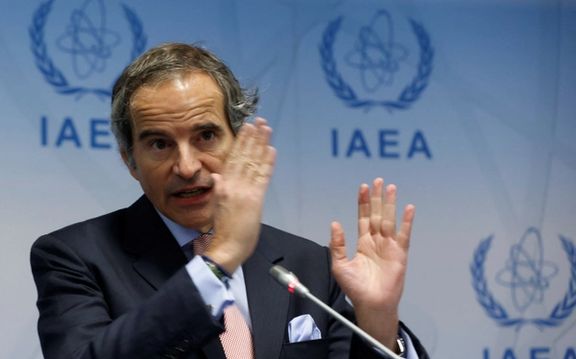
The head of UN’s nuclear agency, Rafael Grossi, told reporters on Monday that his meeting with Iran’s President Ebrahim Raisi March 4 had “enormous importance.”
Pressed by a reporter to say how his latest trip to Tehran was different from all his other previous visits that failed to resolve outstanding issues, Grossi said “there were many differences,” emphasizing that he had a chance to point out the unresolved issues with the Iranian side.
The director general of the International Atomic Agency (IAEA) also added that he had a “very substantive” discussion with Iran’s foreign minister Hossein Amir-Abdollahian. He emphasized that “talking to the decision makers” in politics “makes a big difference.”
Although Grossi highlighted his meetings with Raisi and Amir-Abdollahian, the main decision maker is the country’s ruler Ali Khamenei who controls foreign and military polices.
Grossi argued that in all areas of IAEA interaction with the Islamic Republic there was “substantive” progress. In case of the Fordow uranium enrichment facility “there will be inspection almost every other day,” he said.
In February, news emerged that the IAEA had found uranium particles at Fordow that were enriched to 84 percent – much higher than Iran’s 60-percent enrichment since 2021 – and close to weapons-grade uranium of 90-percent purity.
He also claimed that there were agreements on more monitoring mechanisms, which can mean more instruments placed in nuclear sites.
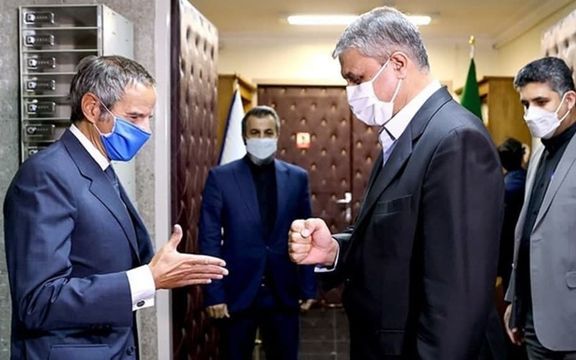
However, Iranian officials and government websites have since denied any increased surveillance except a marginal increase of monitoring at Fordow. They have categorically denied that they agreed with Grossi to allow more cameras to be placed in Iranian nuclear installations.
Asked about these statements Grossi said he is not dismayed because he pays attention to what officials have promised him and watches their actions, emphasizing that “this is a new phase.”
“I believe there is a good opportunity,” the IAEA director said, adding that “I cannot guarantee…when people say these were promises, it is not just promises, we do have certain agreements.”
What was also revealing was Grossi’s statement that “I have to do my job and I continue, and I might have been frustrated as many other people…when there are no results… but this was a step in the right direction.”
What some journalists and critics say is that Iran might have gone a bit further this time to offer cooperation, but Grossi’s trip took place just days before the IAEA Board meeting, which leaves no time to test Tehran’s sincerity before the issue comes up in the meeting.
The Board has already censured Iran in its previous meetings for lack of cooperation with the IAEA, and with the revelation of 84-percent enrichment, the ground was set to issue another rebuke. With Grossi traveling to Tehran right before the meeting and returning with hopes of Iranian cooperation, the Board will have less reason this week to censure the Islamic Republic, although there is no real evidence that it will cooperate fully with the Agency.
Grossi admitted that he cannot even set a timetable for resolving issues with Iran. He told a reporter, who asked if he expected progress by the next Board meeting in June, that “these things take time.”
Regrading the chances to resume JCPOA talks between Iran and the West, Grossi said he is neither optimistic nor pessimistic, as this issue is beyond IAEA’s responsibilities. All he can hope is that his agency does its job to the fullest.
Talks that began in Vienna in April 2021 to revive the 2015 nuclear accord reached a deadlock last September. Since then, the United States has been saying that is not focused on the JCPOA talks, but is concerned about Tehran’s repression against domestic protests and supplying weapons to Russia.